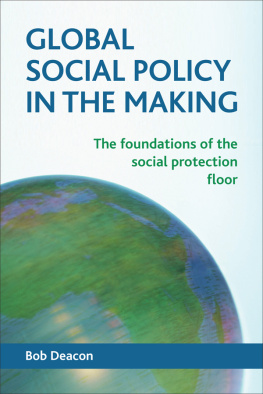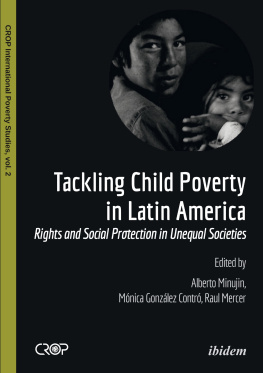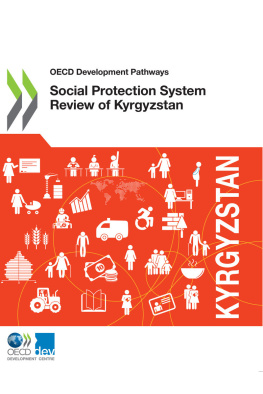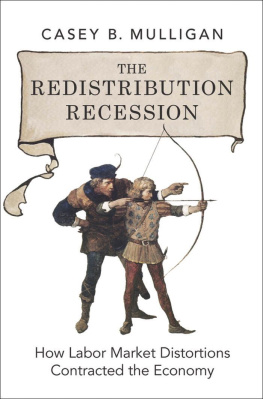Achieving Effective Social Protection for All in Latin America and the Caribbean
Achieving Effective Social Protection for All in Latin America and the Caribbean
From Right to Reality
Helena Ribe
David A. Robalino
Ian Walker

2010 The International Bank for Reconstruction and Development / The World Bank
1818 H Street NW
Washington DC 20433
Telephone: 202-473-1000
Internet: www.worldbank.org
E-mail:
All rights reserved
1 2 3 4 13 12 11 10
This volume is a product of the staff of the International Bank for Reconstruction and Development / The World Bank. The findings, interpretations, and conclusions expressed in this volume do not necessarily reflect the views of the Executive Directors of The World Bank or the governments they represent.
The World Bank does not guarantee the accuracy of the data included in this work. The boundaries, colors, denominations, and other information shown on any map in this work do not imply any judgement on the part of The World Bank concerning the legal status of any territory or the endorsement or acceptance of such boundaries.
Rights and Permissions
The material in this publication is copyrighted. Copying and/or transmitting portions or all of this work without permission may be a violation of applicable law. The International Bank for Reconstruction and Development / The World Bank encourages dissemination of its work and will normally grant permission to reproduce portions of the work promptly.
For permission to photocopy or reprint any part of this work, please send a request with complete information to the Copyright Clearance Center Inc., 222 Rosewood Drive, Danvers, MA 01923, USA; telephone: 978-750-8400; fax: 978-750-4470; Internet: www.copyright.com.
All other queries on rights and licenses, including subsidiary rights, should be addressed to the Office of the Publisher, The World Bank, 1818 H Street NW, Washington, DC 20433, USA; fax: 202-522-2422; e-mail: .
ISBN: 978-0-8213-8398-8
eISBN: 978-0-8213-8399-5
DOI: 10.1596/978-0-8213-8398-8
Cover art: Carla Robalino
Cover design: Quantum Think, Inc.
Library of Congress Cataloging-in-Publication Data
Ribe, Helena, 1949
Achieving effective social protection for all in Latin America and the Caribbean : from right to reality / Helena Ribe, David A. Robalino, and Ian Walker.
p. cm. (Directions in development)
Includes bibliographical references and index.
ISBN 978-0-8213-8398-8 (alk. paper) ISBN 978-0-8213-8399-5
1. Social securityLatin America. 2. Economic assistance, DomesticLatin America. 3. Public welfareLatin America. I. Robalino, David A. II. Walker, Ian, 1957- III. World Bank. IV. Title.
HD7130.5.R53 2010
361.98dc22
2010015476
Foreword
Latin America remains the worlds most unequal region, and one where poverty is therefore greater than it should be, given its level of economic development. In the last decade, however, inequality fell in 12 of the 17 Latin American nations for which comparable data was available, and a number of studies have attributed a non-trivial part of that decline to an expansion in the continents social protection systems. In some countries, an important share of the reduction in absolute poverty appears to have been driven by large-scale social protection innovations, such as conditional cash transfers and non-contributory social pensions.
Nevertheless, the very process of experimentation and organic growth by which social assistance and social insurance programs have developed in many countries has spawned an incomplete and fragmented system, posing a number of challenges to the regions policy makers. Contributory social insurance coverage remains too low, and restricted to formal sector workers. Redistribution within the social insurance system is usually opaque and often regressive. Fragmentation and ill-designed redistribution also create unintended disincentives for work and savings. And improvements in the effectiveness with which social insurance instruments promote investment in human capital and facilitate transitions into good jobs remain both necessary and possible.
Building on careful, detailed analysis of a wealth of data on social protection programs across Latin America and the Caribbean (LAC), this book addresses these various challenges in a thorough yet accessible manner. Although the analysis is comprehensive, the authors focus primarily on three fundamental questions that must be faced by any effort to strengthen social protection in the region: How to protect the most vulnerable without promoting informality and dampening incentives to work and save. How to ensure that scarce public resources are used for subsidies that are transparent, fair, and effective and not for badly targeted and regressive benefits for formal sector workers. How to reinforce human capital development so the more mobile workers the region needs are able to insure themselves through savings or risk pooling arrangements, reducing vulnerability and the need for subsidies.
In providing thoughtful, evidence-based answers to these questions, this volume makes an important contribution to a growing debate among policy makers and social actors in LAC about the costs and inefficiencies of what are at present dualistic systems of social insurance for formal workers and social assistance for others. By necessity, that contribution is informed by a deep understanding of how Latin American labor markets work, and especially of the challenge posed by the prevalence of informality.
The authors develop a compelling, parsimonious conceptual framework for the general principles of social protection reform, highlighting the importance of the behavioral reactions of workers, firms, and service providers to the rules and incentives embedded in social protection policies and programs. But their proposals are also rooted in an in-depth knowledge of the complex realities of the region. They recognize that the starting points, constraints, and social choices will vary by country, and avoid the trap of recommending a simple blueprint. Rather, the book invites policy makers everywhere to step up to the challenge of building an integrated social protection system that treats the population equitably, provides an inclusive safety net for all, promotes efficiency in service provision, and strengthens incentives to build a more flexible human capital, to work, and to save. If that invitation is taken up, the results could combine greater equity with a boost to the regions economic performance.
Augusto de la Torre
Chief Economist
Latin America and the Caribbean Region
The World Bank
Acknowledgments
This book highlights the main findings of a regional study by the World Bank, From Right to Reality: How Latin America and the Caribbean Can Achieve Universal Social Protection by Improving Redistribution and Adapting Programs to Labor Markets (Ribe, Robalino, and Walker, with Kurowski, Mason, Rofman, and Snchez Puerta, forthcoming). This was commissioned by the Chief Economists Office and prepared by the Social Protection Unit in the Latin America and the Caribbean Region of the World Bank under the supervision of Augusto de la Torre and Helena Ribe. Andrew Mason was the initial task team leader, and David Robalino became the task team leader until completion. Chapter authors for the main study included Javier Baez, Andrew Mason, and Helena Ribe (recent trends in Latin America and the Caribbeans [LACs] social protection [SP] systems); David Robalino and Eduardo Zylberstajn (labor markets); Rafael Rofman and David Robalino (old-age income support); Christoph Kurowski and Ian Walker (health); Francesca Lamanna, Helena Ribe, and Ian Walker (income support safety nets); Maria Laura Sanchez Puerta and David Robalino (unemployment insurance and active labor market programs); and David Robalino, and Ian Walker (interactions between different elements of the SP systems and cross-cutting challenges). Background papers and other valuable inputs came from Pablo Acosta, Rodolfo Beazley, Fabio Bertranou, Ramon Castano-Yepes, Aline Coudouel, Wendy Cunningham, Vanessa da Silva Moreira, Mario di Filippo, Alvaro Forteza, Ariela Goldschimit, Jason Hobbs, Theresa Jones, Ricardo Charles Manzano, Edmundo Murrugarra, Christina Novinskey, Francisco Ochoa, Susan Parker, Jose Luis Salas, Manuel Salazar, John Scott, Veronica Silva, Maria Concepcion Steta, Sarah Thomson, Elio Valladares, Manuela Villar, Alejandro Yepes, and Eduardo Zylberstajn. The team gratefully acknowledges the advice and comments from Veronica Alaimo, Caridad Araujo, Laura Chioda, Tito Cordella, Augusto de la Torre, Pablo Fajnzylber, Francisco Ferreira, Margaret Grosh, Marcelo Giugale, Keith Hansen, Richard Hinz, Robert Holzmann, Dorothy Kronick, William Maloney, John Nash, Ana Revenga, Gonzalo Reyes, Jamele Rigolini, Jaime Saavedra, Ilias Skamnelos, Andras Uthoff, Salvador Valds, Milan Vodopivec, and Hlio Zylberstajn. Special thanks to Fiona Mackintosh, Lerick Kebeck, Sandra Len, and Julia Nannucci, who contributed to the editing and production of this report.









